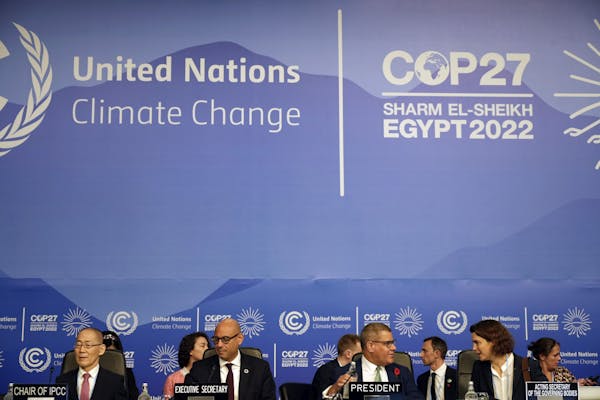How ‘climate mainstreaming’ can address climate change and further development goals
Photo: Water reserve cisterns are seen on the roof of a building backdropped by the Ancient Greek Concordia temple in Agrigento, southern Sicily, Italy in July 2024. Climate change is making droughts worse around the world. (AP Photo/Andrew Medichini)
Canada’s first National Adaptation Strategy urges Canadians to consider climate change impacts in their everyday decisions.
The strategy calls such an approach “climate mainstreaming.” The approach states that:
“as climate impacts become more severe and frequent, and the costs mount, incorporating adaptation considerations in health, social, environmental, infrastructure and economic decisions-making is critical to ensure that our collective efforts keep pace.”
Similar statements are outlined in the 2023 press release of the Intergovernmental Panel on Climate Change (IPCC). The IPCC Chair Hoesung Lee stated, “mainstreaming effective and equitable climate action will not only reduce losses and damages for nature and people, it will also provide wider benefits.”
Global greenhouse gas emissions need to be cut 43 per cent from 2019 to 2030 to limit global warming to 1.5 C. At the 2023 United Nations climate conference (COP28) in Dubai, parties were deemed off track in meeting their Paris Agreement goals.
A rapid and meaningful expansion of climate mainstreaming — the integration of climate considerations into all development programs and policies — is vital for addressing the urgent global climate crisis.
Why mainstream climate change?
Mainstreaming climate considerations ensures that responses to climate change are systemically embedded in all policies and actions, rather than treated as a separate issue. This integration allows for more comprehensive and cost-effective interventions by addressing multiple issues at once.
For instance, within an ongoing program focused on improving food safety in informal, outdoor markets through enhanced hygienic practices, mainstreaming might entail additional activities related to climate adaptation such as raising awareness among food vendors about the importance of refrigeration during heatwaves to prevent bacterial growth.
Failing to mainstream climate considerations can hinder climate action as well as result in maladaptation, which occurs when well-intentioned development actions inadvertently increase climate impacts. For example, seawalls can protect people and property from damage in the short term. However, if they are not part of a long-term plan that can adapt to changing conditions, they can trap communities in risky situations and increase their exposure to climate risks over time.

While attention to climate mainstreaming calls for the prioritization of climate considerations across all policy arenas, progress remains slow and uneven due primarily to an institutional resistance to change. Climate action is often seen as the responsibility of a single sector rather than the collective, and incremental changes are inferior to transformative ones.
Furthermore, climate mainstreaming is often narrowly interpreted as simply the addition of climate to existing structures and initiatives. Often derisively dubbed a “just add climate and stir” approach.
To help address these preconceptions, our research has explored how climate mainstreaming challenges resemble similar decades-long struggles to mainstream gender equality across international and national public policy agendas. The question we have asked is: what can climate mainstreaming learn from gender mainstreaming?
Insights from gender mainstreaming
The longer history of gender mainstreaming, including institutional investments dating back to 1990s, offers lessons about policy and institutional bottlenecks of mainstreaming. These lessons can help tackle political and institutional challenges of climate mainstreaming. The UN system, with clear gender and climate mainstreaming targets, offers a suitable arena for analysis.
In a new study published in 2024, we reviewed documents of United Nations agencies working in the food and agriculture sector, which is strongly impacted by climate change. We found varying degrees of gender and climate mainstreaming across selected UN agencies.
Key areas where climate mainstreaming fell short compared to gender mainstreaming included: strategic planning, leadership, organizational culture and accountability.
Our review showed ways to improve climate mainstreaming. Here are three actions governments, development partners and industries can take now:
Use multiple strategies: draw upon gender mainstreaming good practices to adopt both broad climate initiatives and specific interventions.
Build institutional accountability: establish strong mechanisms to track progress in climate mainstreaming. The UN’s framework for gender mainstreaming can act as a useful model. This would help ensure transparency, monitoring and a stronger commitment to climate action.
Adopt a climate justice perspective: uphold the needs of climate change-vulnerable populations and prioritize collective human and environmental rights over economic growth. Ensure diverse stakeholders participate across all levels of decision-making.
Accountable and integrated climate justice interventions are prerequisites for a more sustainable and resilient future. Financing is another.
Financing is key
While mainstreaming is important, it is nothing without adequate financing. The 2015 Paris Agreement requires high-income countries to contribute $100 billion annually. However, this goal has not been met, and the existing funds are unevenly distributed.
Historically disadvantaged countries are the least responsible for yet the most impacted by climate crisis. These countries are largely left to balance development and climate action investments in a generally unjust international financial system.
In 2022, official development assistance reached US$204 billion, but this still left nearly half of the humanitarian requirements unmet. Rich countries spent only 0.36 per cent of their total income on aid — slightly up from 0.33 per cent in 2021, but still much lower than the 0.7 per cent promised back in 1970.
With the financing to back it up, a climate mainstreaming perspective may just be the solution to addressing both global development and climate goals.
Source: theconversation.com



